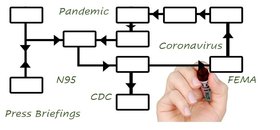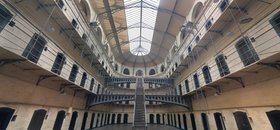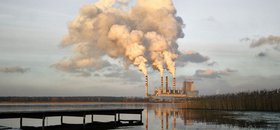Time to decarbonize 'critical infrastructure'

Writing in The Advocate (Baton Rouge and New Orleans), Member Scholar Karen Sokol observes that, " During the pandemic, the [energy] industry is using its 'critical infrastructure' status to further accelerate its polluting activities. The industry asked the Trump administration for an indefinite suspension of its obligations to comply with basic environmental and public health protections even though communities near polluting facilities have suffered higher death rates from COVID-19. The administration responded quickly, depriving communities of these vital safeguards with no clear date for reinstating them."
Read PDF
Author(s): Karen Sokol
The Trump Administration’s Pandemic Response is Structured to Fail

Writing for the Regulatory Review, CPR Member Scholars Alejandro Camacho and Robert Glicksman describe the structural failings of the Trump administration's response to the coronavirus pandemic.
Read PDF
Author(s): Alejandro Camacho, Robert Glicksman
Beware efforts absolving companies of COVID-19 liability

Writing in the Waco Tribune, Thomas McGarity warns that Sen. Mitch McConnell's effort to extend a federal COVID-19 liability shield over businesses will endanger workers' lives. Such immunity from accountability would allow employers to force workers to choose between losing their jobs or returning to workplaces where they are not sufficiently protected from the coronavirus.
Read PDF
Author(s): Thomas McGarity
More Needs to Be Done to Protect Our Meat and Poultry Workers

In the Baltimore Sun: President Donald Trump invoked the Defense Production Act to order meat and poultry plants to continue operating despite COVID-19 outbreaks, exposing Maryland's poultry workers to enormous risks. Poultry processors haven't demonstrated they're able to keep workers safe and healthy, but they know that many of these low-wage workers will be forced to return. To top it all off, one of the president's goals with this order was to provide legal immunity to companies, so that they can't be sued by employees who are infected as a result of unsafe working conditions.
Read PDF Read Online
Author(s): Matt Shudtz, Rachel Micah-Jones
As coronavirus infections peak, profit-driven hospital systems must be held accountable

In the Boston Globe, Shalanda Baker and colleagues write that "The announcement that Carney Hospital in Dorchester would become the country’s first dedicated COVID-19 hospital was largely hailed as a welcome expansion of hospital capacity in response to the outbreak. This hospital normally serves as a safety net for low-income residents in Dorchester.... Although it is unclear whether [this and similar hospital sitings] put the surrounding communities at greater risk of infection, they follow a broader pattern emerging in COVID-19 hot spots. As New York, Boston, and other jurisdictions decide where to erect makeshift hospitals, stakeholders must remain vigilant regarding this pattern of burdening low-income communities and communities of color. This oversight is especially needed in the case of for-profit entities.
Read PDF
Author(s): Shalanda H. Baker
Our Chemical Regulatory Program Is Broken. Here’s How to Fix It.

Writing in Undark, CPR Member Scholar Wendy Wagner and co-author Will Walker write that the existing framework for chemical regulation puts too much burden on EPA and too little on manufacturers.
Read PDF
Author(s): Wendy Wagner
Opinion analysis: The Justices' purpose-full reading of the Clean Water Act

Writing for SCOTUSBlog, CPR's Lisa Heinzerling discusses the Supreme Court's April 2020 ruling in a Clean Water Act case from Hawaii. The ruling requires a permit when a point source of pollution adds pollutants to navigable waters through groundwater, if the addition of pollutants is "the functional equivalent of a direct discharge" from the source into navigable waters. She writes that "Perhaps the most striking feature of Justice Stephen Breyer's opinion for the majority is its interpretive method. The opinion reads like something from a long-ago period of statutory interpretation, before statutory decisions regularly made the central meaning of complex laws turn on a single word or two and banished legislative purpose to the interpretive fringes."
Read Online
Author(s): Lisa Heinzerling
Parole Hearings Should Be Resumed for Public Health

Writing for AL.com, Heather Elliott calls on the Alabama Director of the Bureau of Pardons and Paroles to resume holding parole hearings amidst the coronavirus pandemic, and to do so electronically, in light of the governor's order waiving face-to-face hearing requirements. She notes that an outbreak of coronavirus in a prison setting could lead to many unnecessary deaths.
Read PDF
Author(s): Heather Elliott
Virus provides lessons on government, science and politics

Joseph Tomain, writing in the Cincinnati Enquirer, discusses lessons to be learned -- so far -- from the coronavirus pandemic.
Read PDF
Author(s): Joseph Tomain
The Pandemic and Industry Opportunism

Writing for The Regulatory Review, Rena Steinzor notes that in March 2020, with the coronavirus pandemic in full swing, EPA enforcement chief Susan Bodine issued a memo offering businesses assurance that EPA would overlook certain regulatory violations for the duration of the COVID-19 crisis. Public interest groups roundly criticized the new policy, prompting EPA to cry "fake news."
Read Online
Author(s): Rena Steinzor
